Презентация parts of the sentence
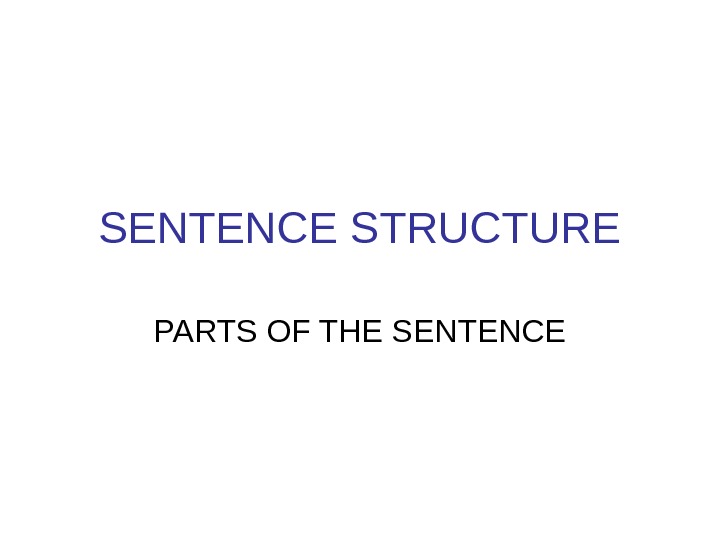
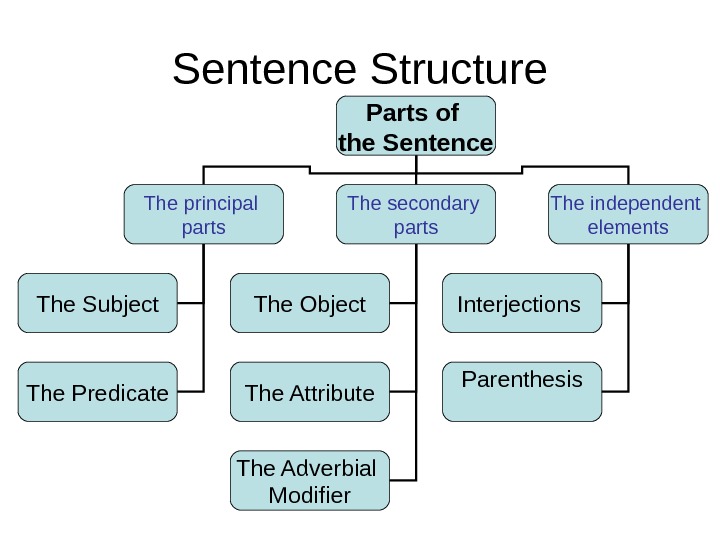
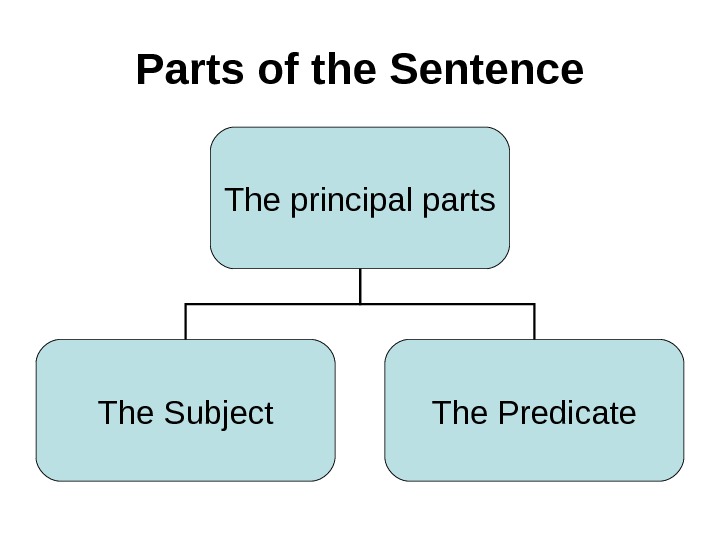
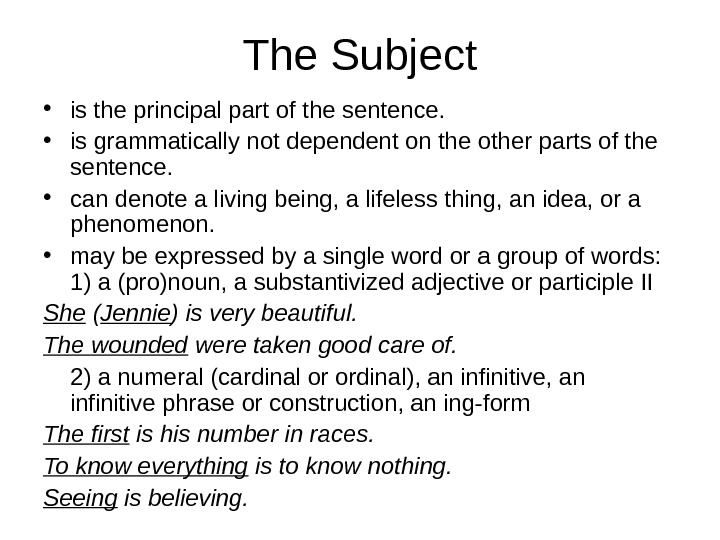
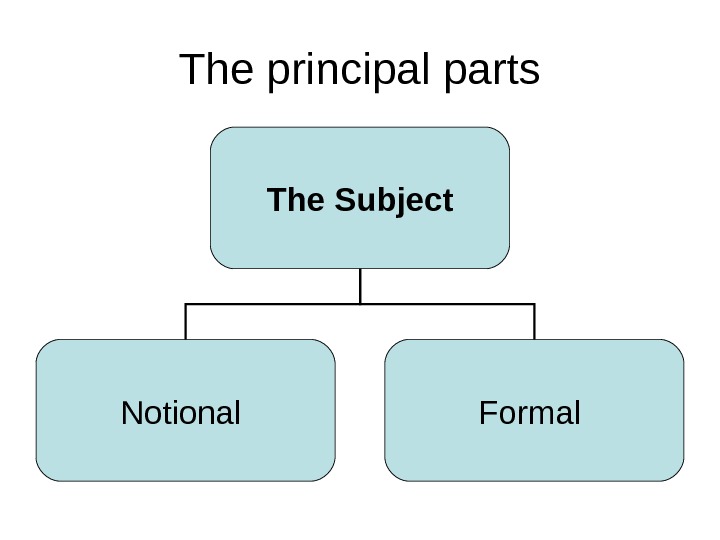
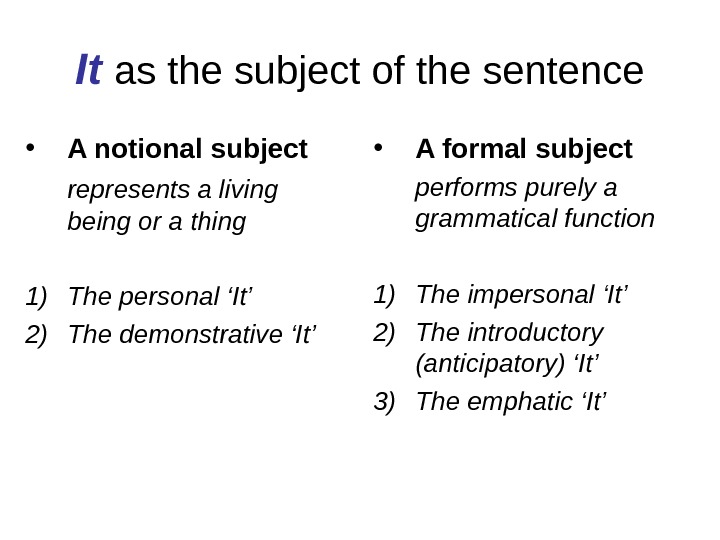
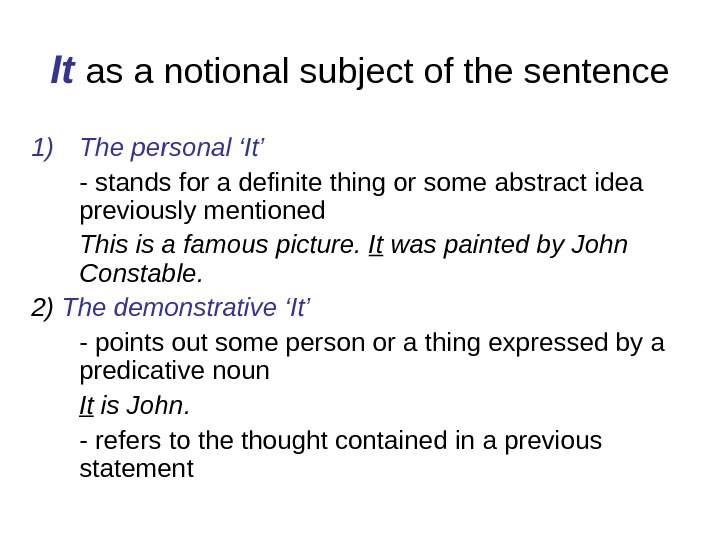
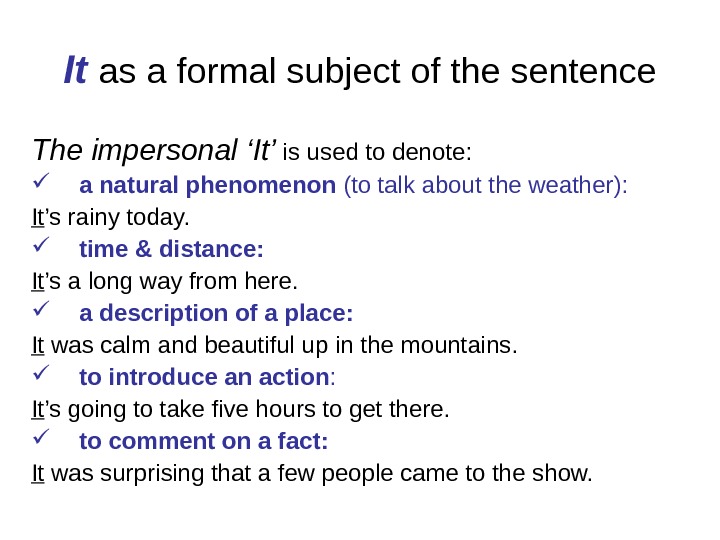
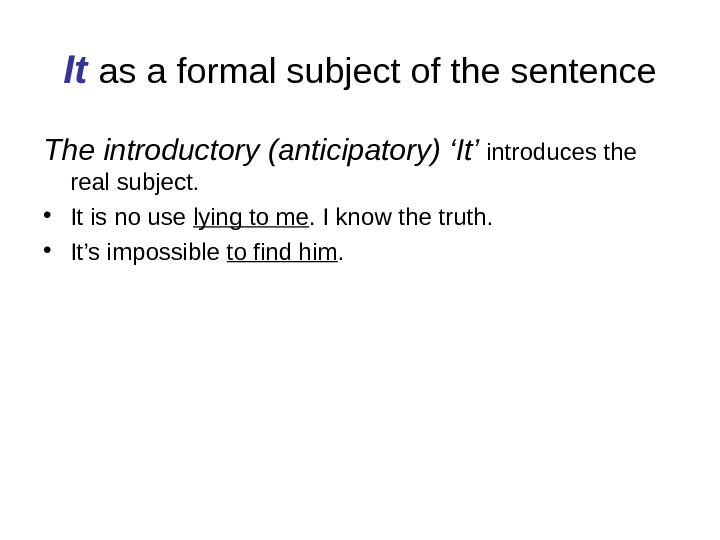
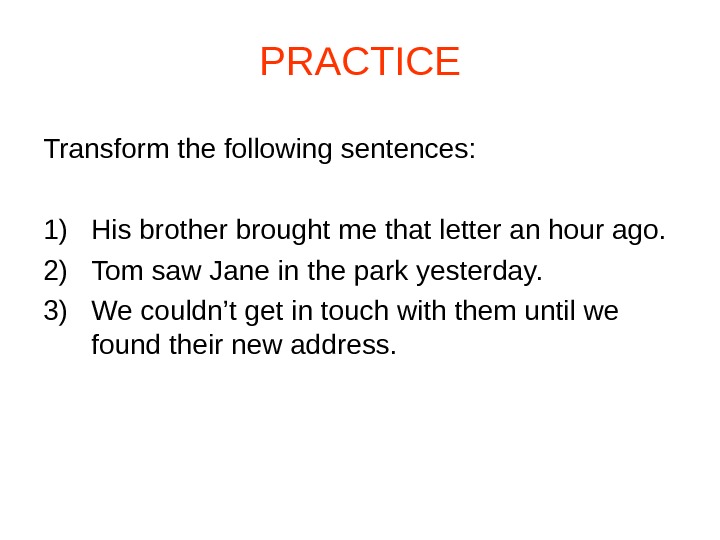
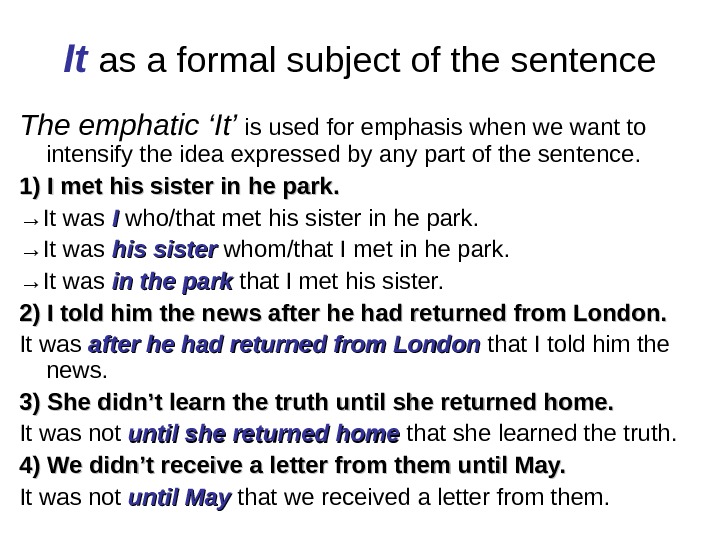
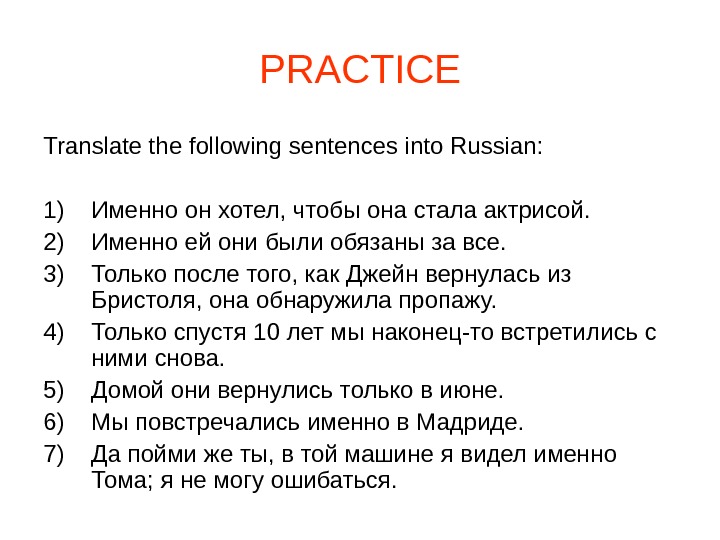
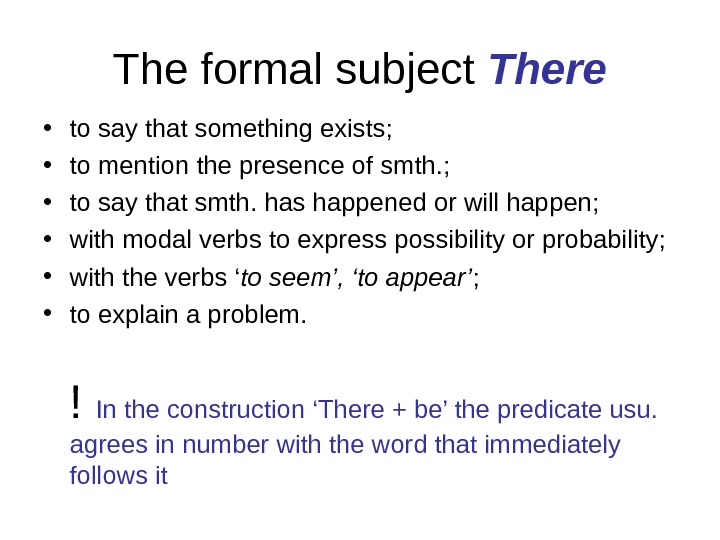
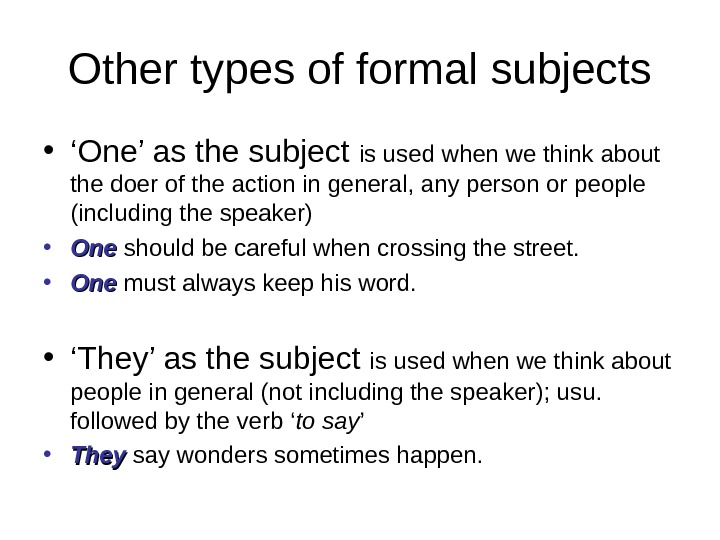
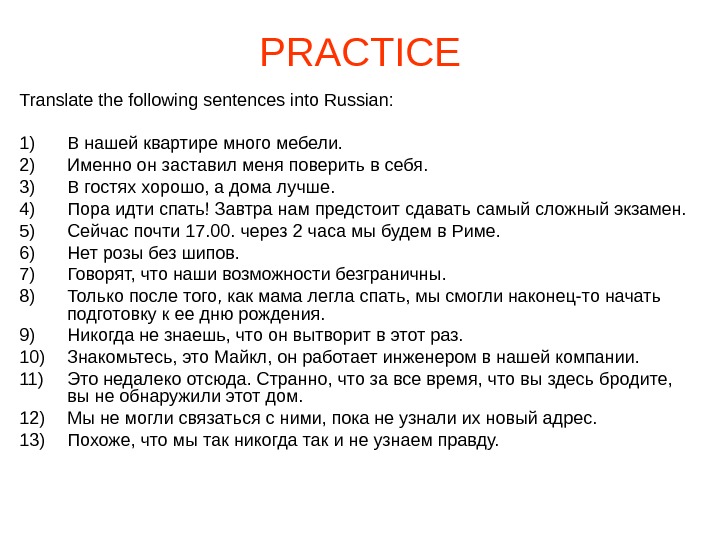
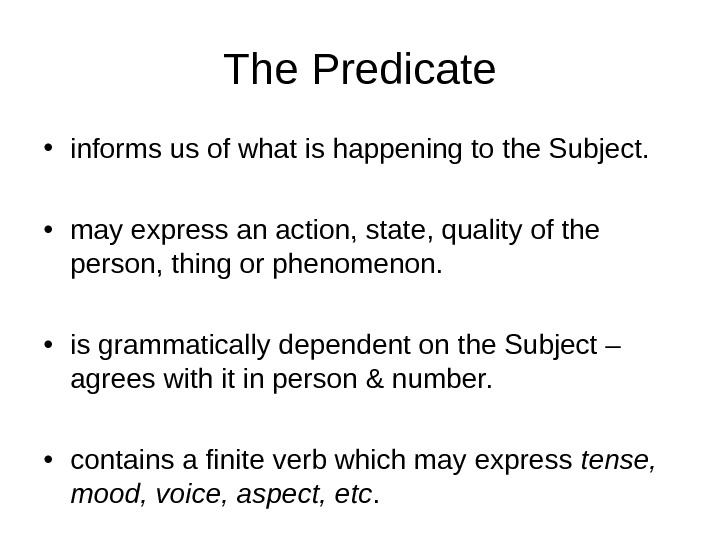
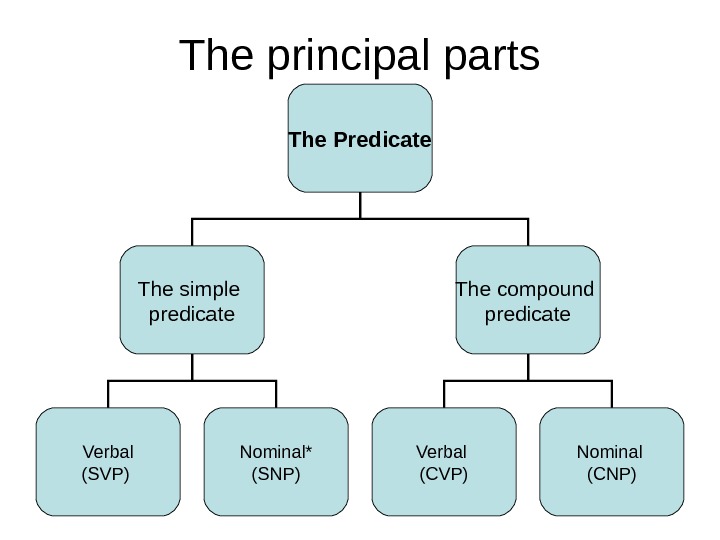
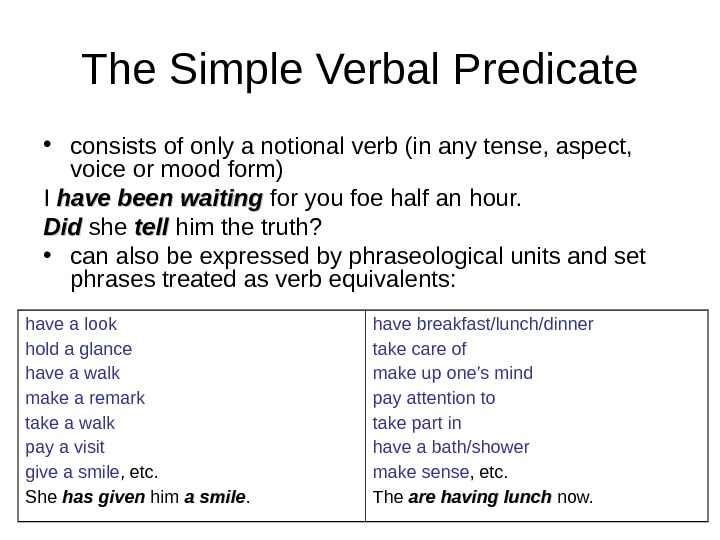
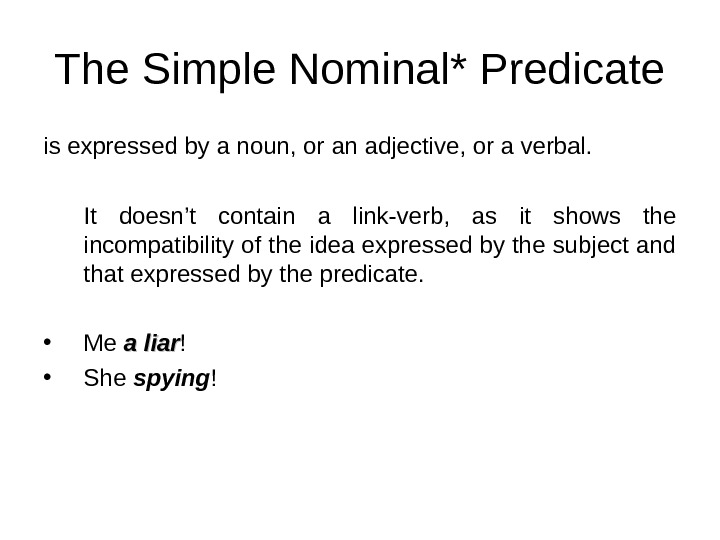
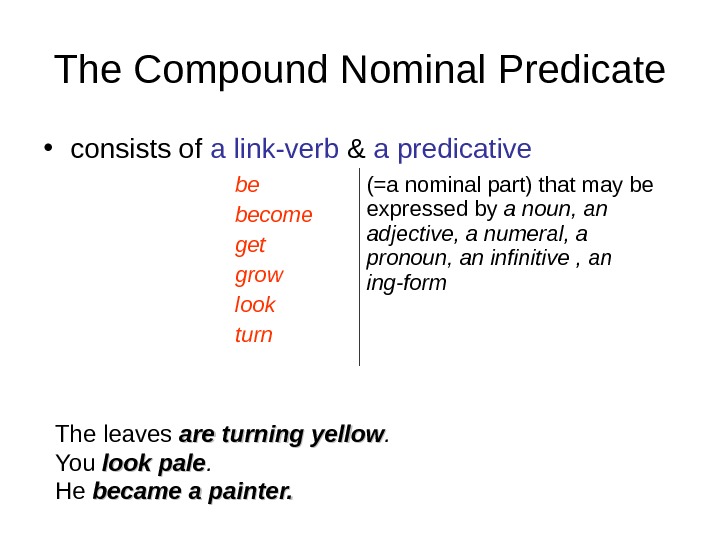
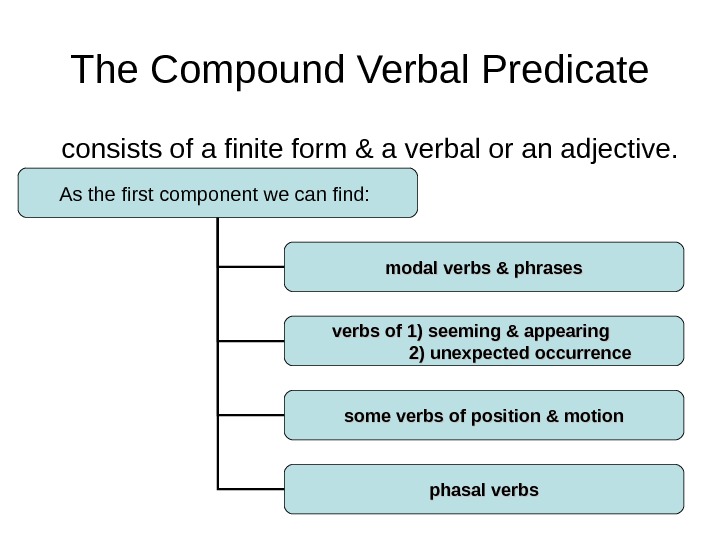
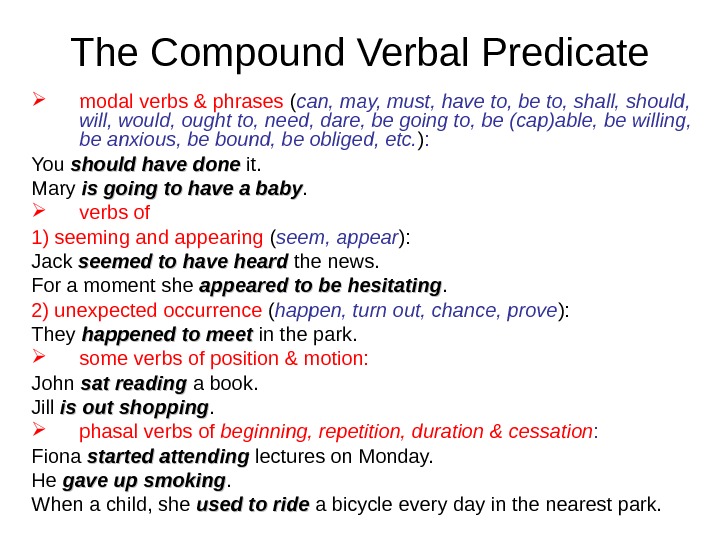
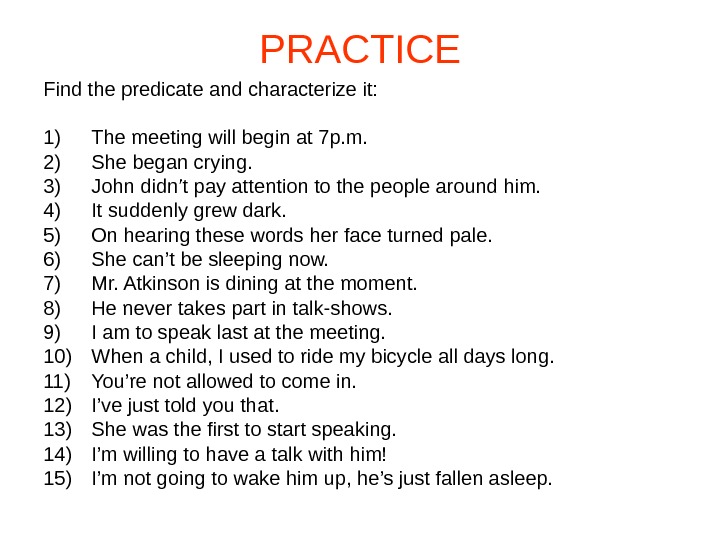
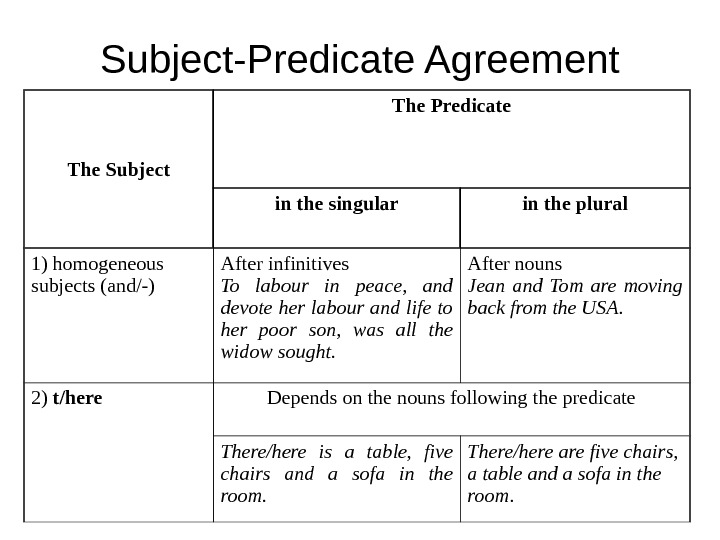
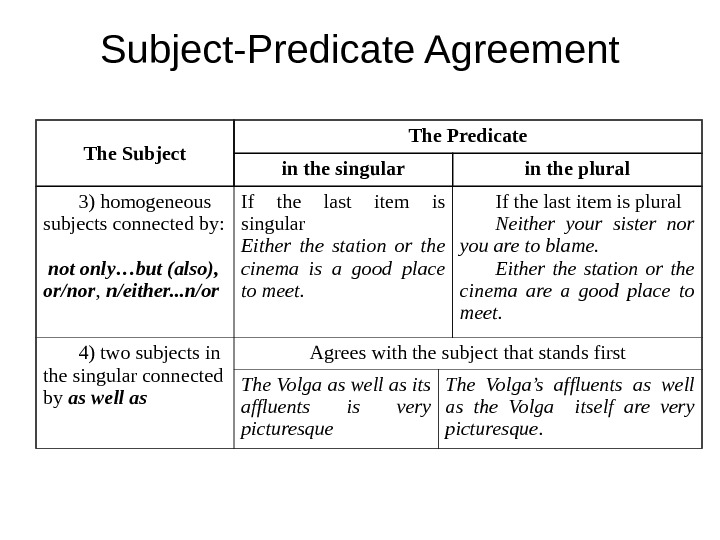
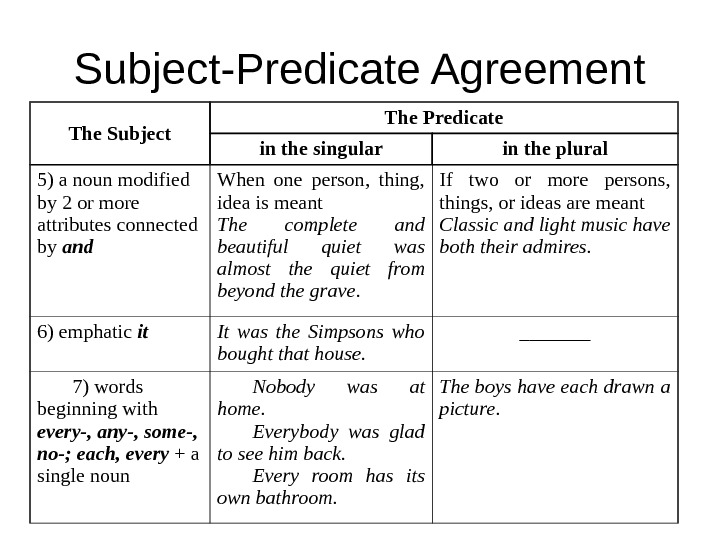
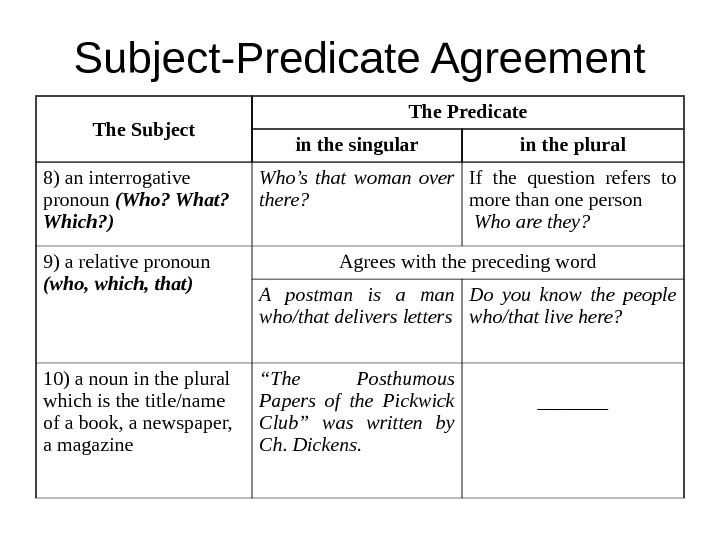
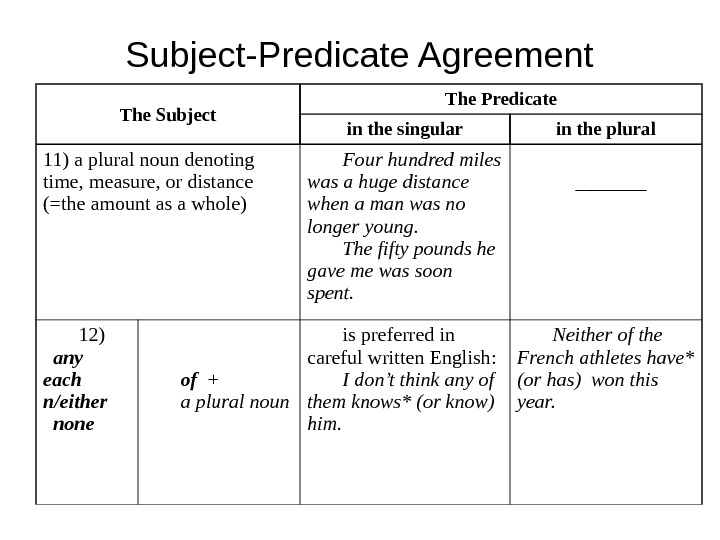
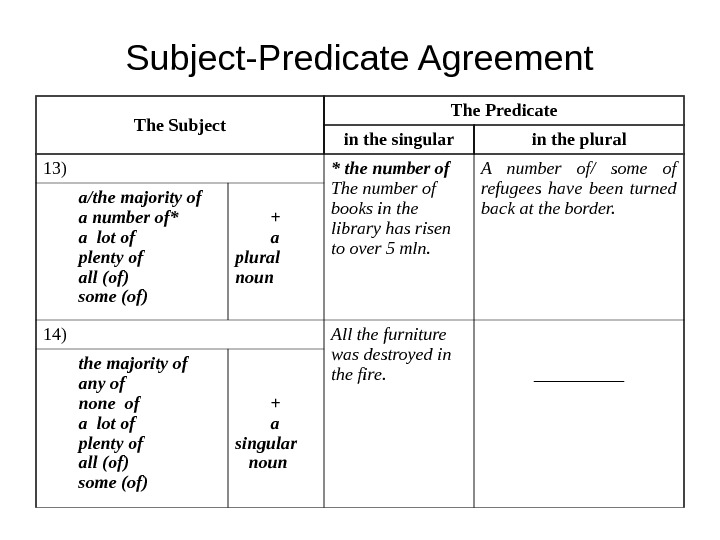
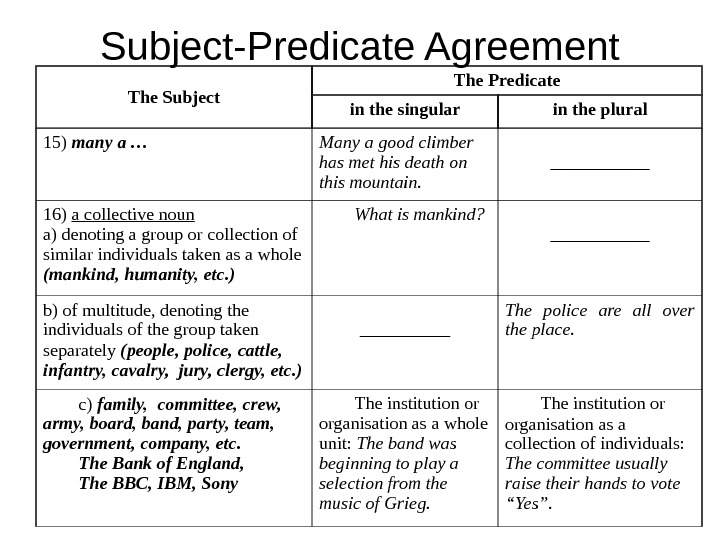
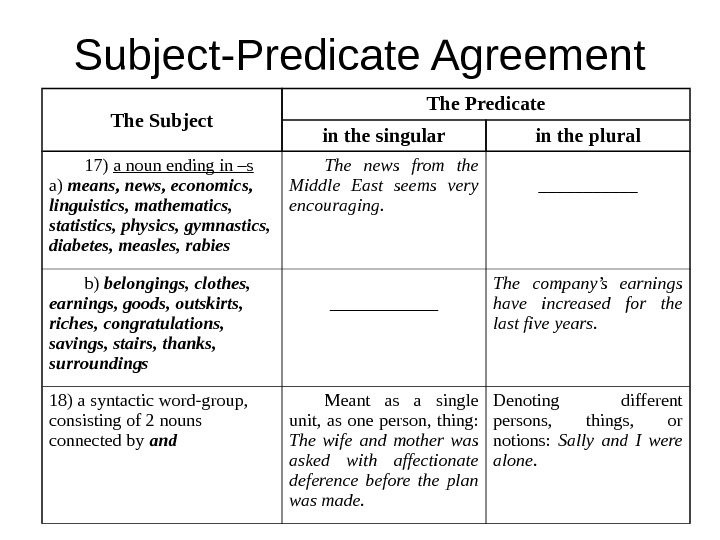
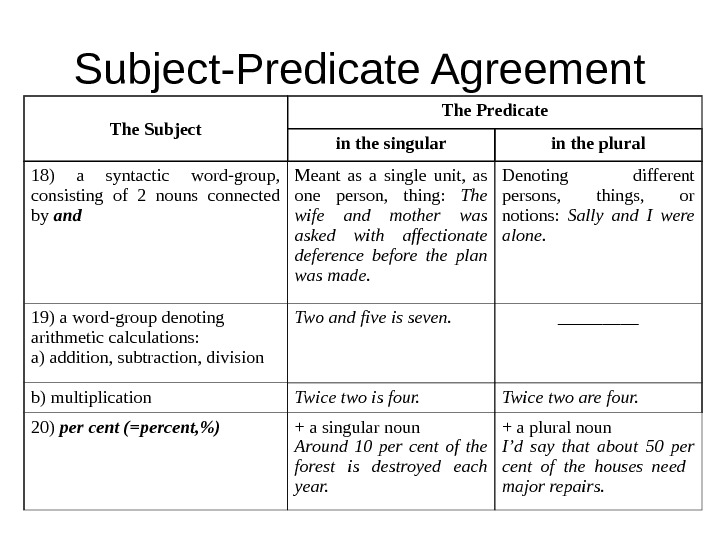
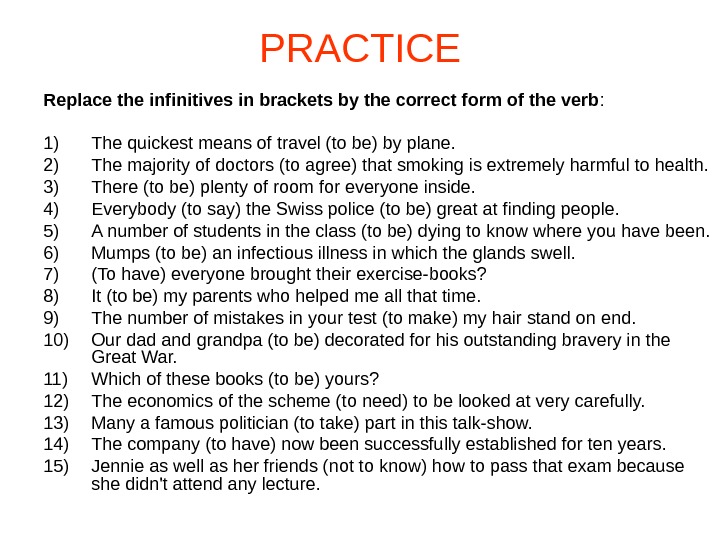
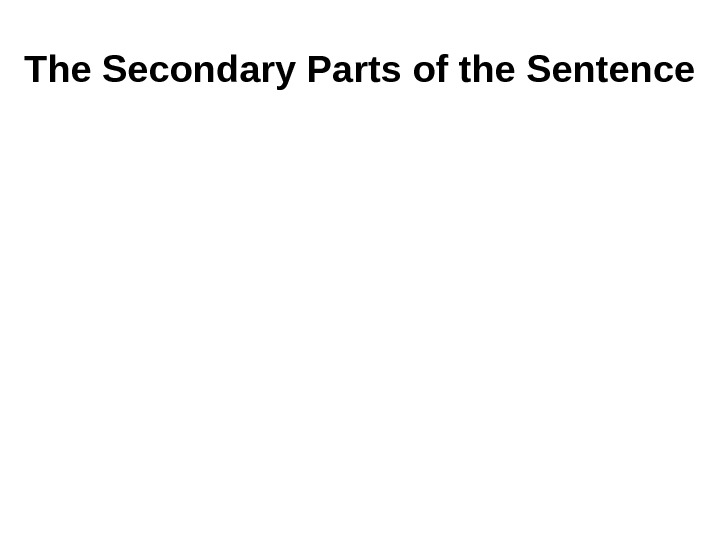
- Размер: 523.5 Кб
- Количество слайдов: 34
Описание презентации Презентация parts of the sentence по слайдам
 SENTENCE STRUCTURE PARTS OF THE SENTEN
SENTENCE STRUCTURE PARTS OF THE SENTEN
 Sentence Structure Parts of the Sentence The principal parts The secondary parts The independent elements The Subject The Predicate The Object The Attribute The Adverbial Modifier Interjections Parenthesis
Sentence Structure Parts of the Sentence The principal parts The secondary parts The independent elements The Subject The Predicate The Object The Attribute The Adverbial Modifier Interjections Parenthesis
 Parts of the Sentence The principal parts The Subject The Predicate
Parts of the Sentence The principal parts The Subject The Predicate
 The Subject • is the principal part of the sentence. • is grammatically not dependent on the other parts of the sentence. • can denote a living being, a lifeless thing, an idea, or a phenomenon. • may be expressed by a single word or a group of words: 1) a (pro)noun, a substantivized adjective or participle II She ( Jennie ) is very beautiful. The wounded were taken good care of. 2) a numeral (cardinal or ordinal), an infinitive phrase or construction, an ing-form The first is his number in races. To know everything is to know nothing. Seeing is believing.
The Subject • is the principal part of the sentence. • is grammatically not dependent on the other parts of the sentence. • can denote a living being, a lifeless thing, an idea, or a phenomenon. • may be expressed by a single word or a group of words: 1) a (pro)noun, a substantivized adjective or participle II She ( Jennie ) is very beautiful. The wounded were taken good care of. 2) a numeral (cardinal or ordinal), an infinitive phrase or construction, an ing-form The first is his number in races. To know everything is to know nothing. Seeing is believing.
 The principal parts The Subject Notional Formal
The principal parts The Subject Notional Formal
 It as the subject of the sentence • A notional subject represents a living being or a thing 1) The personal ‘It’ 2) The demonstrative ‘It’ • A formal subject performs purely a grammatical function 1) The impersonal ‘It’ 2) The introductory (anticipatory) ‘It’ 3) The emphatic ‘It’
It as the subject of the sentence • A notional subject represents a living being or a thing 1) The personal ‘It’ 2) The demonstrative ‘It’ • A formal subject performs purely a grammatical function 1) The impersonal ‘It’ 2) The introductory (anticipatory) ‘It’ 3) The emphatic ‘It’
 It as a notional subject of the sentence 1) The personal ‘It’ — stands for a definite thing or some abstract idea previously mentioned This is a famous picture. It was painted by John Constable. 2) The demonstrative ‘It’ — points out some person or a thing expressed by a predicative noun It is John. — refers to the thought contained in a previous statement
It as a notional subject of the sentence 1) The personal ‘It’ — stands for a definite thing or some abstract idea previously mentioned This is a famous picture. It was painted by John Constable. 2) The demonstrative ‘It’ — points out some person or a thing expressed by a predicative noun It is John. — refers to the thought contained in a previous statement
 It as a formal subject of the sentence The impersonal ‘It’ is used to denote: a natural phenomenon (to talk about the weather): It ’s rainy today. time & distance: It ’s a long way from here. a description of a place: It was calm and beautiful up in the mountains. to introduce an action : It ’s going to take five hours to get there. to comment on a fact: It was surprising that a few people came to the show.
It as a formal subject of the sentence The impersonal ‘It’ is used to denote: a natural phenomenon (to talk about the weather): It ’s rainy today. time & distance: It ’s a long way from here. a description of a place: It was calm and beautiful up in the mountains. to introduce an action : It ’s going to take five hours to get there. to comment on a fact: It was surprising that a few people came to the show.
 It as a formal subject of the sentence The introductory (anticipatory) ‘It’ introduces the real subject. • It is no use lying to me. I know the truth. • It’s impossible to find him.
It as a formal subject of the sentence The introductory (anticipatory) ‘It’ introduces the real subject. • It is no use lying to me. I know the truth. • It’s impossible to find him.
 PRACTICE Transform the following sentences: 1) His brother brought me that letter an hour ago. 2) Tom saw Jane in the park yesterday. 3) We couldn’t get in touch with them until we found their new address.
PRACTICE Transform the following sentences: 1) His brother brought me that letter an hour ago. 2) Tom saw Jane in the park yesterday. 3) We couldn’t get in touch with them until we found their new address.
 It as a formal subject of the sentence The emphatic ‘It’ is used for emphasis when we want to intensify the idea expressed by any part of the sentence. 1) I met his sister in he park. → It was I I who/that met his sister in he park. → It was his sister whom/that I met in he park. → It was in the park that I met his sister. 2) I told him the news after he had returned from London. It was after he had returned from London that I told him the news. 3) She didn’t learn the truth until she returned home. It was not until she returned home that she learned the truth. 4) We didn’t receive a letter from them until May. It was not until May that we received a letter from them.
It as a formal subject of the sentence The emphatic ‘It’ is used for emphasis when we want to intensify the idea expressed by any part of the sentence. 1) I met his sister in he park. → It was I I who/that met his sister in he park. → It was his sister whom/that I met in he park. → It was in the park that I met his sister. 2) I told him the news after he had returned from London. It was after he had returned from London that I told him the news. 3) She didn’t learn the truth until she returned home. It was not until she returned home that she learned the truth. 4) We didn’t receive a letter from them until May. It was not until May that we received a letter from them.
 PRACTICE Translate the following sentences into Russian: 1) Именно он хотел, чтобы она стала актрисой. 2) Именно ей они были обязаны за все. 3) Только после того, как Джейн вернулась из Бристоля, она обнаружила пропажу. 4) Только спустя 10 лет мы наконец-то встретились с ними снова. 5) Домой они вернулись только в июне. 6) Мы повстречались именно в Мадриде. 7) Да пойми же ты, в той машине я видел именно Тома; я не могу ошибаться.
PRACTICE Translate the following sentences into Russian: 1) Именно он хотел, чтобы она стала актрисой. 2) Именно ей они были обязаны за все. 3) Только после того, как Джейн вернулась из Бристоля, она обнаружила пропажу. 4) Только спустя 10 лет мы наконец-то встретились с ними снова. 5) Домой они вернулись только в июне. 6) Мы повстречались именно в Мадриде. 7) Да пойми же ты, в той машине я видел именно Тома; я не могу ошибаться.
 The formal subject There • to say that something exists; • to mention the presence of smth. ; • to say that smth. has happened or will happen; • with modal verbs to express possibility or probability; • with the verbs ‘ to seem’, ‘to appear’ ; • to explain a problem. ! In the construction ‘There + be’ the predicate usu. agrees in number with the word that immediately follows it
The formal subject There • to say that something exists; • to mention the presence of smth. ; • to say that smth. has happened or will happen; • with modal verbs to express possibility or probability; • with the verbs ‘ to seem’, ‘to appear’ ; • to explain a problem. ! In the construction ‘There + be’ the predicate usu. agrees in number with the word that immediately follows it
 Other types of formal subjects • ‘ One’ as the subject is used when we think about the doer of the action in general, any person or people (including the speaker) • One should be careful when crossing the street. • One must always keep his word. • ‘ They’ as the subject is used when we think about people in general (not including the speaker); usu. followed by the verb ‘ to say ’ • They say wonders sometimes happen.
Other types of formal subjects • ‘ One’ as the subject is used when we think about the doer of the action in general, any person or people (including the speaker) • One should be careful when crossing the street. • One must always keep his word. • ‘ They’ as the subject is used when we think about people in general (not including the speaker); usu. followed by the verb ‘ to say ’ • They say wonders sometimes happen.
 PRACTICE Translate the following sentences into Russian: 1) В нашей квартире много мебели. 2) Именно он заставил меня поверить в себя. 3) В гостях хорошо, а дома лучше. 4) Пора идти спать! Завтра нам предстоит сдавать самый сложный экзамен. 5) Сейчас почти 17. 00. через 2 часа мы будем в Риме. 6) Нет розы без шипов. 7) Говорят, что наши возможности безграничны. 8) Только после того, как мама легла спать, мы смогли наконец-то начать подготовку к ее дню рождения. 9) Никогда не знаешь, что он вытворит в этот раз. 10) Знакомьтесь, это Майкл, он работает инженером в нашей компании. 11) Это недалеко отсюда. Странно, что за все время, что вы здесь бродите, вы не обнаружили этот дом. 12) Мы не могли связаться с ними, пока не узнали их новый адрес. 13) Похоже, что мы так никогда так и не узнаем правду.
PRACTICE Translate the following sentences into Russian: 1) В нашей квартире много мебели. 2) Именно он заставил меня поверить в себя. 3) В гостях хорошо, а дома лучше. 4) Пора идти спать! Завтра нам предстоит сдавать самый сложный экзамен. 5) Сейчас почти 17. 00. через 2 часа мы будем в Риме. 6) Нет розы без шипов. 7) Говорят, что наши возможности безграничны. 8) Только после того, как мама легла спать, мы смогли наконец-то начать подготовку к ее дню рождения. 9) Никогда не знаешь, что он вытворит в этот раз. 10) Знакомьтесь, это Майкл, он работает инженером в нашей компании. 11) Это недалеко отсюда. Странно, что за все время, что вы здесь бродите, вы не обнаружили этот дом. 12) Мы не могли связаться с ними, пока не узнали их новый адрес. 13) Похоже, что мы так никогда так и не узнаем правду.
 The Predicate • informs us of what is happening to the Subject. • may express an action, state, quality of the person, thing or phenomenon. • is grammatically dependent on the Subject – agrees with it in person & number. • contains a finite verb which may express tense, mood, voice, aspect, etc.
The Predicate • informs us of what is happening to the Subject. • may express an action, state, quality of the person, thing or phenomenon. • is grammatically dependent on the Subject – agrees with it in person & number. • contains a finite verb which may express tense, mood, voice, aspect, etc.
 The principal parts The Predicate The simple predicate The compound predicate Verbal (SVP) Nominal* (SNP) Verbal (CVP) Nominal (CNP)
The principal parts The Predicate The simple predicate The compound predicate Verbal (SVP) Nominal* (SNP) Verbal (CVP) Nominal (CNP)
 The Simple Verbal Predicate • consists of only a notional verb (in any tense, aspect, voice or mood form) I have been waiting for you foe half an hour. Did she tell him the truth? • can also be expressed by phraseological units and set phrases treated as verb equivalents: have a look hold a glance have a walk make a remark take a walk pay a visit give a smile , etc. She has given him a smile. have breakfast/lunch/dinner take care of make up one’s mind pay attention to take part in have a bath/shower make sense , etc. The are having lunch now.
The Simple Verbal Predicate • consists of only a notional verb (in any tense, aspect, voice or mood form) I have been waiting for you foe half an hour. Did she tell him the truth? • can also be expressed by phraseological units and set phrases treated as verb equivalents: have a look hold a glance have a walk make a remark take a walk pay a visit give a smile , etc. She has given him a smile. have breakfast/lunch/dinner take care of make up one’s mind pay attention to take part in have a bath/shower make sense , etc. The are having lunch now.
 The Simple Nominal* Predicate is expressed by a noun, or an adjective, or a verbal. It doesn’t contain a link-verb, as it shows the incompatibility of the idea expressed by the subject and that expressed by the predicate. • Me a liar ! • She spying !
The Simple Nominal* Predicate is expressed by a noun, or an adjective, or a verbal. It doesn’t contain a link-verb, as it shows the incompatibility of the idea expressed by the subject and that expressed by the predicate. • Me a liar ! • She spying !
 The Compound Nominal Predicate • consists of a link-verb & a predicative be become get grow look turn (=a nominal part) that may be expressed by a noun, an adjective, a numeral, a pronoun, an infinitive , an ing-form The leaves are turning yellow. You look pale. He became a painter.
The Compound Nominal Predicate • consists of a link-verb & a predicative be become get grow look turn (=a nominal part) that may be expressed by a noun, an adjective, a numeral, a pronoun, an infinitive , an ing-form The leaves are turning yellow. You look pale. He became a painter.
 The Compound Verbal Predicate consists of a finite form & a verbal or an adjective. As the first component we can find: modal verbs & phrases verbs of 1) seeming & appearing 2) unexpected occurrence some verbs of position & motion phasal verbs
The Compound Verbal Predicate consists of a finite form & a verbal or an adjective. As the first component we can find: modal verbs & phrases verbs of 1) seeming & appearing 2) unexpected occurrence some verbs of position & motion phasal verbs
 The Compound Verbal Predicate modal verbs & phrases ( can, may, must, have to, be to, shall, should, will, would, ought to, need, dare, be going to, be (cap)able, be willing, be anxious, be bound, be obliged, etc. ) : You should have done it. Mary is going to have a baby. verbs of 1) seeming and appearing ( seem, appear ): Jack seemed to have heard the news. For a moment she appeared to be hesitating. 2) unexpected occurrence ( happen, turn out, chance, prove ): They happened to meet in the park. some verbs of position & motion: John sat reading a book. Jill is out shopping. phasal verbs of beginning, repetition, duration & cessation : Fiona started attending lectures on Monday. He gave up smoking. When a child, she used to ride a bicycle every day in the nearest park.
The Compound Verbal Predicate modal verbs & phrases ( can, may, must, have to, be to, shall, should, will, would, ought to, need, dare, be going to, be (cap)able, be willing, be anxious, be bound, be obliged, etc. ) : You should have done it. Mary is going to have a baby. verbs of 1) seeming and appearing ( seem, appear ): Jack seemed to have heard the news. For a moment she appeared to be hesitating. 2) unexpected occurrence ( happen, turn out, chance, prove ): They happened to meet in the park. some verbs of position & motion: John sat reading a book. Jill is out shopping. phasal verbs of beginning, repetition, duration & cessation : Fiona started attending lectures on Monday. He gave up smoking. When a child, she used to ride a bicycle every day in the nearest park.
 PRACTICE Find the predicate and characterize it: 1) The meeting will begin at 7 p. m. 2) She began crying. 3) John didn’t pay attention to the people around him. 4) It suddenly grew dark. 5) On hearing these words her face turned pale. 6) She can’t be sleeping now. 7) Mr. Atkinson is dining at the moment. 8) He never takes part in talk-shows. 9) I am to speak last at the meeting. 10) When a child, I used to ride my bicycle all days long. 11) You’re not allowed to come in. 12) I’ve just told you that. 13) She was the first to start speaking. 14) I’m willing to have a talk with him! 15) I’m not going to wake him up, he’s just fallen asleep.
PRACTICE Find the predicate and characterize it: 1) The meeting will begin at 7 p. m. 2) She began crying. 3) John didn’t pay attention to the people around him. 4) It suddenly grew dark. 5) On hearing these words her face turned pale. 6) She can’t be sleeping now. 7) Mr. Atkinson is dining at the moment. 8) He never takes part in talk-shows. 9) I am to speak last at the meeting. 10) When a child, I used to ride my bicycle all days long. 11) You’re not allowed to come in. 12) I’ve just told you that. 13) She was the first to start speaking. 14) I’m willing to have a talk with him! 15) I’m not going to wake him up, he’s just fallen asleep.
 Subject-Predicate Agreement The Subject The Predicate in the singular in the plural 1) homogeneous subjects (and/-) After infinitives To labour in peace, and devote her labour and life to her poor son, was all the widow sought. After nouns Jean and Tom are moving back from the USA. 2) t/here Depends on the nouns following the predicate There/here is a table, five chairs and a sofa in the room. There/here are five chairs, a table and a sofa in the room.
Subject-Predicate Agreement The Subject The Predicate in the singular in the plural 1) homogeneous subjects (and/-) After infinitives To labour in peace, and devote her labour and life to her poor son, was all the widow sought. After nouns Jean and Tom are moving back from the USA. 2) t/here Depends on the nouns following the predicate There/here is a table, five chairs and a sofa in the room. There/here are five chairs, a table and a sofa in the room.
 Subject-Predicate Agreement The Subject The Predicate in the singular in the plural 3) homogeneous subjects connected by: not only…but (also), or/nor , n/either. . . n/or If the last item is singular Either the station or the cinema is a good place to meet. If the last item is plural Neither your sister nor you are to blame. Either the station or the cinema are a good place to meet. 4) two subjects in the singular connected by as well as Agrees with the subject that stands first The Volga as well as its affluents is very picturesque The Volga’s affluents as well as the Volga itself are very picturesque.
Subject-Predicate Agreement The Subject The Predicate in the singular in the plural 3) homogeneous subjects connected by: not only…but (also), or/nor , n/either. . . n/or If the last item is singular Either the station or the cinema is a good place to meet. If the last item is plural Neither your sister nor you are to blame. Either the station or the cinema are a good place to meet. 4) two subjects in the singular connected by as well as Agrees with the subject that stands first The Volga as well as its affluents is very picturesque The Volga’s affluents as well as the Volga itself are very picturesque.
 Subject-Predicate Agreement The Subject The Predicate in the singular in the plural 5) a noun modified by 2 or more attributes connected by and When one person, thing, idea is meant The complete and beautiful quiet was almost the quiet from beyond the grave. If two or more persons, things, or ideas are meant Classic and light music have both their admires. 6) emphatic it It was the Simpsons who bought that house. _____ __ 7) words beginning with every-, any-, some-, no-; each, every + a single noun Nobody was at home. Everybody was glad to see him back. Every room has its own bathroom. The boys have each drawn a picture.
Subject-Predicate Agreement The Subject The Predicate in the singular in the plural 5) a noun modified by 2 or more attributes connected by and When one person, thing, idea is meant The complete and beautiful quiet was almost the quiet from beyond the grave. If two or more persons, things, or ideas are meant Classic and light music have both their admires. 6) emphatic it It was the Simpsons who bought that house. _____ __ 7) words beginning with every-, any-, some-, no-; each, every + a single noun Nobody was at home. Everybody was glad to see him back. Every room has its own bathroom. The boys have each drawn a picture.
 Subject-Predicate Agreement The Subject The Predicate in the singular in the plural 8) an interrogative pronoun (Who? What? Which? ) Who’s that woman over there? If the question refers to more than one person Who are they? 9) a relative pronoun (who, which, that) Agrees with the preceding word A postman is a man who/that delivers letters Do you know the people who/that live here? 10) a noun in the plural which is the title/name of a book, a newspaper, a magazine “ The Posthumous Papers of the Pickwick Club” was written by Ch. Dickens. _______
Subject-Predicate Agreement The Subject The Predicate in the singular in the plural 8) an interrogative pronoun (Who? What? Which? ) Who’s that woman over there? If the question refers to more than one person Who are they? 9) a relative pronoun (who, which, that) Agrees with the preceding word A postman is a man who/that delivers letters Do you know the people who/that live here? 10) a noun in the plural which is the title/name of a book, a newspaper, a magazine “ The Posthumous Papers of the Pickwick Club” was written by Ch. Dickens. _______
 Subject-Predicate Agreement The Subject The Predicate in the singular in the plural 11) a plural noun denoting time, measure, or distance (=the amount as a whole) Four hundred miles was a huge distance when a man was no longer young. The fifty pounds he gave me was soon spent. _______ 12) any each n/either none of + a plural noun is preferred in careful written English : I don’t think any of them knows* (or know) him. Neither of the French athletes have* (or has) won this year.
Subject-Predicate Agreement The Subject The Predicate in the singular in the plural 11) a plural noun denoting time, measure, or distance (=the amount as a whole) Four hundred miles was a huge distance when a man was no longer young. The fifty pounds he gave me was soon spent. _______ 12) any each n/either none of + a plural noun is preferred in careful written English : I don’t think any of them knows* (or know) him. Neither of the French athletes have* (or has) won this year.
 Subject-Predicate Agreement The Subject The Predicate in the singular in the plural 13) * the number of The number of books in the library has risen to over 5 mln. A number of/ some of refugees have been turned back at the border. a/the majority of a number of* a lot of plenty of all (of) some (of) + a plural noun 14) All the furniture was destroyed in the fire. _____the majority of any of none of a lot of plenty of all (of) some (of) + a singular noun
Subject-Predicate Agreement The Subject The Predicate in the singular in the plural 13) * the number of The number of books in the library has risen to over 5 mln. A number of/ some of refugees have been turned back at the border. a/the majority of a number of* a lot of plenty of all (of) some (of) + a plural noun 14) All the furniture was destroyed in the fire. _____the majority of any of none of a lot of plenty of all (of) some (of) + a singular noun
 Subject-Predicate Agreement The Subject The Predicate in the singular in the plural 15) many a … Many a good climber has met his death on this mountain. ______ 16) a collective noun a) denoting a group or collection of similar individuals taken as a whole (mankind, humanity, etc. ) What is mankind? ______ b) of multitude, denoting the individuals of the group taken separately (people, police, cattle, infantry, cavalry, jury, clergy, etc. ) _____ The police are all over the place. c) family, committee, crew, army, board, band, party, team, government, company, etc. The Bank of England, The BBC, IBM, Sony The institution or organisation as a whole unit: The band was beginning to play a selection from the music of Grieg. The institution or organisation as a collection of individuals: The committee usually raise their hands to vote “Yes”.
Subject-Predicate Agreement The Subject The Predicate in the singular in the plural 15) many a … Many a good climber has met his death on this mountain. ______ 16) a collective noun a) denoting a group or collection of similar individuals taken as a whole (mankind, humanity, etc. ) What is mankind? ______ b) of multitude, denoting the individuals of the group taken separately (people, police, cattle, infantry, cavalry, jury, clergy, etc. ) _____ The police are all over the place. c) family, committee, crew, army, board, band, party, team, government, company, etc. The Bank of England, The BBC, IBM, Sony The institution or organisation as a whole unit: The band was beginning to play a selection from the music of Grieg. The institution or organisation as a collection of individuals: The committee usually raise their hands to vote “Yes”.
 Subject-Predicate Agreement The Subject The Predicate in the singular in the plural 17) a noun ending in –s a) means, news, economics, linguistics, mathematics, statistics, physics, gymnastics, diabetes, measles, rabies The news from the Middle East seems very encouraging. ______ b) belongings, clothes, earnings, goods, outskirts, riches, congratulations, savings, stairs, thanks, surroundings ______ The company’s earnings have increased for the last five years. 18) a syntactic word-group, consisting of 2 nouns connected by and Meant as a single unit, as one person, thing: The wife and mother was asked with affectionate deference before the plan was made. Denoting different persons, things, or notions: Sally and I were alone.
Subject-Predicate Agreement The Subject The Predicate in the singular in the plural 17) a noun ending in –s a) means, news, economics, linguistics, mathematics, statistics, physics, gymnastics, diabetes, measles, rabies The news from the Middle East seems very encouraging. ______ b) belongings, clothes, earnings, goods, outskirts, riches, congratulations, savings, stairs, thanks, surroundings ______ The company’s earnings have increased for the last five years. 18) a syntactic word-group, consisting of 2 nouns connected by and Meant as a single unit, as one person, thing: The wife and mother was asked with affectionate deference before the plan was made. Denoting different persons, things, or notions: Sally and I were alone.
 Subject-Predicate Agreement The Subject The Predicate in the singular in the plural 18) a syntactic word-group, consisting of 2 nouns connected by and Meant as a single unit, as one person, thing : The wife and mother was asked with affectionate deference before the plan was made. Denoting different persons, things, or notions: Sally and I were alone. 19) a word-group denoting arithmetic calculations: a) addition, subtraction, division Two and five is seven. _____ b) multiplication Twice two is four. Twice two are four. 20) per cent (=percent, %) + a singular noun Around 10 per cent of the forest is destroyed each year. + a plural noun I’d say that about 50 per cent of the houses need major repairs.
Subject-Predicate Agreement The Subject The Predicate in the singular in the plural 18) a syntactic word-group, consisting of 2 nouns connected by and Meant as a single unit, as one person, thing : The wife and mother was asked with affectionate deference before the plan was made. Denoting different persons, things, or notions: Sally and I were alone. 19) a word-group denoting arithmetic calculations: a) addition, subtraction, division Two and five is seven. _____ b) multiplication Twice two is four. Twice two are four. 20) per cent (=percent, %) + a singular noun Around 10 per cent of the forest is destroyed each year. + a plural noun I’d say that about 50 per cent of the houses need major repairs.
 PRACTICE Replace the infinitives in brackets by the correct form of the verb : 1) The quickest means of travel (to be) by plane. 2) The majority of doctors (to agree) that smoking is extremely harmful to health. 3) There (to be) plenty of room for everyone inside. 4) Everybody (to say) the Swiss police (to be) great at finding people. 5) A number of students in the class (to be) dying to know where you have been. 6) Mumps (to be) an infectious illness in which the glands swell. 7) (To have) everyone brought their exercise-books? 8) It (to be) my parents who helped me all that time. 9) The number of mistakes in your test (to make) my hair stand on end. 10) Our dad and grandpa (to be) decorated for his outstanding bravery in the Great War. 11) Which of these books (to be) yours? 12) The economics of the scheme (to need) to be looked at very carefully. 13) Many a famous politician (to take) part in this talk-show. 14) The company (to have) now been successfully established for ten years. 15) Jennie as well as her friends (not to know) how to pass that exam because she didn’t attend any lecture.
PRACTICE Replace the infinitives in brackets by the correct form of the verb : 1) The quickest means of travel (to be) by plane. 2) The majority of doctors (to agree) that smoking is extremely harmful to health. 3) There (to be) plenty of room for everyone inside. 4) Everybody (to say) the Swiss police (to be) great at finding people. 5) A number of students in the class (to be) dying to know where you have been. 6) Mumps (to be) an infectious illness in which the glands swell. 7) (To have) everyone brought their exercise-books? 8) It (to be) my parents who helped me all that time. 9) The number of mistakes in your test (to make) my hair stand on end. 10) Our dad and grandpa (to be) decorated for his outstanding bravery in the Great War. 11) Which of these books (to be) yours? 12) The economics of the scheme (to need) to be looked at very carefully. 13) Many a famous politician (to take) part in this talk-show. 14) The company (to have) now been successfully established for ten years. 15) Jennie as well as her friends (not to know) how to pass that exam because she didn’t attend any lecture.
 The Secondary Parts of the Sentence
The Secondary Parts of the Sentence
